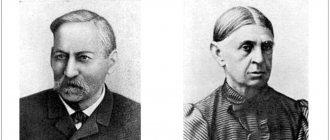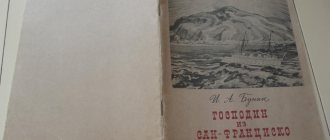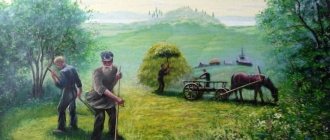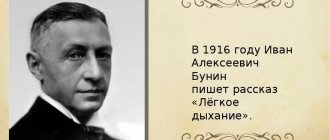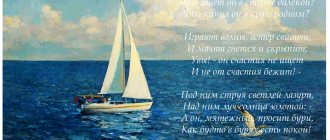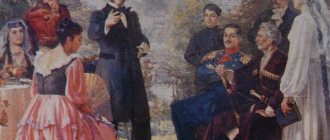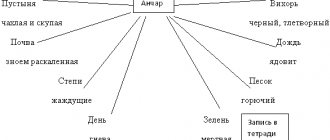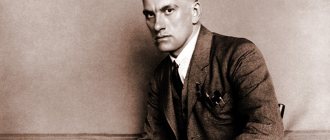Brief Analysis
Before reading this analysis, we recommend that you familiarize yourself with the poem to the Motherland.
History of creation - The poem was written in 1896, during a difficult period in the life of the writer, who was experiencing financial instability and a break with his beloved.
The theme of the poem is Love for the Motherland. This poem belongs to civil poetry.
Composition - The poem is conventionally divided into two parts. The first part contains the author’s reproach to those citizens who accuse the Motherland of squalor. The second part is a detailed comparison.
Genre – – Lyrical poem.
Poetic meter : Iambic tetrameter with cross rhyme.
Metaphors – “looks with a smile of compassion.”
Epithets – “poor looking”, “black huts”, “calm and impudent”.
Comparisons - “the homeland is compared with a woman-mother, tired, timid and sad...”
Personifications - “reproach you with your simplicity.”
Composition structure
The poem “Motherland” includes only two stanzas, each of which has 4 lines. However, even in this short text the author was able to express the mood and the depth of his ideas. The composition of the work is conventionally divided into two parts:
- In the first, Bunin describes the gloomy Russian landscape. The reader is presented with a bleak picture of one winter day at sunset, in which there is nothing remarkable or attractive. Using expressive means, the poet manages to convey the mood and color palette of that day. The expanse of Russian nature with its huge forests, described by Ivan Alekseevich, involuntarily brings darkness and despondency. The sky is a dead lead shade, the distance from home and the dark forest cause a depressive mood.
- The second stanza seems more optimistic. In it, the author managed to smooth out the heavy feeling created by the first part of the verse. The description of the beauties of nature becomes more abstract and soft, bringing only light sadness.
In eight lines of the poem, Bunin managed to recreate the winter landscape of Russia and convey all the gloominess of the feelings that he sometimes experienced while looking at its endless white expanses.
Composition
The work consists of three stanzas, but they fully manage to convey the author’s mood and idea.
Compositionally, the poem is divided into two conventional parts. In the first part (first stanza) the author reproaches those citizens who do not treat their homeland like sons and accuse it of squalor. The second part is a detailed comparison. The homeland and its citizens, who often talk about what the homeland should be like, but do not see the real reality, do not love the homeland with all their hearts as it is, do not empathize with it, are compared to their mother, wretched, tired, but nevertheless sincerely loving, and a son, calm and impudent, ashamed of his wretched mother.
The poetic meter is iambic tetrameter with cross rhyme.
Subject
In the center of the plot is a dull picture of Russian nature against the backdrop of a fading winter day. Unlike most Russian poets and writers, Bunin treated the surrounding reality with a great deal of criticism. This approach can be safely called the harsh truth of life, not embellished with any fantasies or false phrases.
The poet is not inclined to idealize Russian nature. Moreover, he chooses the least suitable moment for contemplating it - the last minutes of the passing winter day. The feeling of melancholy intensifies when describing the immensity of the expanses covered with gloomy pine forests.
However, the poem does not overwhelm with a depressive mood. There are notes of optimism in Bunin's realism. Peace is brought by the “milky blue” fog diffused in space, which gives hope for a happy outcome.
Such a description of the Russian landscape does not serve as proof that Bunin despised Russia. On the contrary, he passionately loved his homeland, and missed it immensely during his forced emigration. He did not close his eyes to the shortcomings and all the ugliness of reality, but this did not prevent him from experiencing the most tender feelings for his homeland.
Means of expression
In his work, Ivan Alekseevich uses a variety of artistic means designed to give the poem the depth of experience of the lyrical hero, to convey as accurately as possible the feelings that the poet experienced when writing these lines (the lyrical hero and the author in this poem are as close as possible).
The epithets are very eloquent (“wretched appearance”, “black huts”, “timid, sad, tired mother”, “son, calm, impudent”), built on an antithesis (the feelings of mother and son are opposed). The second and third stanzas are one extended comparison (“so a son is ashamed of his mother...”). There are also personifications (“they reproach you with your simplicity”) and metaphors (“he looks with a smile of compassion”).
Essay: The theme of Russia in the works of I.A. Bunina
(675 words) Ivan Alekseevich Bunin is a famous Russian writer of the first half of the twentieth century. With his creativity, Bunin made a huge contribution to the development of Russian literature. No wonder Maxim Gorky once called Bunin “the foremost master in modern Russian literature.”
Each writer in his own way revealed the image of great Russia in his works. For example, Lermontov claimed that he loved his native country with a “strange love.” Mikhail Yuryevich glorified people's Russia. Nekrasov admired the Russian peasantry, on whom he placed great hopes for a bright future. Let's take a closer look at how the image of Russia is revealed in the works of Ivan Bunin.
It is no secret that Bunin continued the traditions of the great Russian authors, but introduced new features into the image of Russia. The writer worked at a very difficult time for the country, when the fate of Russia was repeatedly decided. The Russo-Japanese War, three revolutions and the First World War left a deep mark on the life path of the Motherland. It was during this period that Ivan Alekseevich tried to comprehend Russian reality and wrote works that would later become the highlight of his work: “Antonov Apples”, “Mowers”, “Pines”, “The Life of Arsenyev” and so on. In each work, the reader sees patriarchal rural Russia, but in a nostalgic light, because the author lost it forever after radical historical transformations.
For example, Bunin wrote his famous story “Mowers” while in exile in 1921. Here the author idealizes the image of Russia. In this work, the reader notices how strong Ivan Alekseevich’s love for his native land is. At the beginning of the story, the writer wholeheartedly admires the unprecedented beauty of Russian nature:
“All around us were fields, the wilderness of central, primordial Russia. It was late afternoon on a June day. The old high road, overgrown with curly grass, cut by dead ruts, traces of the ancient life of our fathers and grandfathers, stretched out before us into the endless Russian distance...”
The author describes all the signs of familiar pre-revolutionary Russia. This is both the road as one of the symbols of the country and a mention of the older generation. The writer does not notice the passage of time in this atmosphere of peace and regularity. Then Bunin talks about the mowers, in whom he sees a “blood relationship” with his native land. In their songs, strong peasants express the joy of their work. The song of the mowers evokes amazement among those who hear it:
“The beauty was that we were all children of our homeland and were all together and we all felt good, calm and loving... And there was also the beauty that this homeland, this common home of ours was Russia...”
It would seem that these beautiful words should evoke only admiration in the reader, but one phrase spoils the whole mood:
“It was a long time ago, it was an infinitely long time ago, because the life that we all lived at that time will not return forever.”
The same mood permeates another famous work by Bunin, “Antonov Apples.” It tells of lost beauty, former tranquility. There is a feeling that the author lives with memories:
“I remember an early fine autumn... I remember an early, fresh, quiet morning...”
In the life I lived there were completely different people. According to the author, they were healthier, stronger and more beautiful. The writer admires the peasants, mentioning their spiritual connection with the small nobility. Bunin also admits:
“And I remember that sometimes it seemed extremely tempting to me to be a man.”
The author, with pain in his heart, regrets that his old life is over:
“The old people died. Anna Gerasimovna died in Vyselki, Arseny Semenych shot himself...”
The way of life in Russia has changed. It is Antonov apples that personify the old way of life, harmony and mutual understanding between people. Antonov apples symbolize what has been lost over time.
A slightly different mood can be seen in Bunin’s work “Sukhodol”. Here the writer no longer admires the similarity of life between peasants and landowners. In this work, Ivan Alekseevich talks about the Russian national character, embodied in the image of Natalya. The heroine devoted her entire life to Sukhodol. It is Natalya who tells the current generation how people lived in Sukhodol in the old days. The reader is simultaneously frightened by the heroine’s stories and admires them. Bunin endowed his heroine with a “beautiful and pitiful” soul. Natalya is capable of strong and sincere love, she has intelligence and imagination. However, despite these worthy qualities, she makes no effort to change her life. The heroine only submits to everything. People do not have the strength to change their lives for the better, and, according to the author, both landowners and peasants are to blame for this. This was the main problem of former Russia.
Ivan Alekseevich in his works showed a complex and multifaceted image of Russia, full of unsolved mysteries. The writer masterfully showed the reader the tragic fate of the Russian people. Bunin's work is imbued with an incredible feeling of love and compassion for great Russia.
Author: Victoria Komarova
The main idea in the poem "Motherland"
Bunin's poem "Motherland" is very short, but hides a deep meaning.
The writer tries to convey to the reader many things that are characteristic of humanity. The author notes that a serious, deadly threat hangs over the vast, vast homeland. And although the author does not directly express his doubts, it becomes clear that there is no great confidence in the greatness of the brilliant power. But the situation is not hopeless. The gloomy coloring gives way to illusory hope. A long-suffering people, capable of withstanding and enduring much, will be ready for new challenges. The sadness that shrouds the entire poem has probably accumulated over centuries. After all, humility, submission and resignation are the main features of the centuries-old oppression of the common man in Rus'.
The contradictory feelings that the works evoke make us rethink reality and believe in the possibility of revival.
Poverty and peasants
During the period of its formation as an independent and independent power, Russia went through a difficult, thorny path.
Ivan Alekseevich was a nobleman by birth, but he sincerely sympathized with the peasants who, after the abolition of serfdom, for 35 years remained, as before, poor, ragged, and illiterate. Traveling through the Russian hinterlands easily reveals all the shortcomings and disadvantages that have accumulated during the period of reforms. The author says so: “And there is no end to the pine forests, and the villages are far away.” It was not only Bunin who described the country’s poverty. Many Wanderers of that time, for example, Alexander Blok wrote “Sinful and shameless...”
In describing the gloomy situation, the author uses one of his favorite moves - he attracts nature, endowing the lines with sad definitions: a deathly leaden sky, gentle sadness, gloomy distance. There are no decorations in the work that would allow us to present our homeland from the best side. But the author did not set such a goal.
Symbols
“The Twilight Distance” speaks of how huge this country is and how endless it seems. “Deadly leaden” describes the feeling as if your soul is becoming empty. You can see a connection in this with frosty winter landscapes, specifically the “snowy desert”. All the depression and devastation is especially well conveyed by the line: “There is no end to the pine forests.” The hero feels sad, experiences many experiences and understands how all these spaces perfectly reflect his entire soul - in front of him is a gloomy distance and the only thing that hides him from the vision of a gloomy and gloomy future is a fog that seems unreal.
Ridicule of the poem
The entire work “Motherland” fits on a small piece of paper, since it only has eight lines.
These poetic rhymes do not reveal the true potential of the writer himself; they do not show the author’s pronounced individual traits. The rhymes are not perfect, and the poem itself may seem damp. This was what amazed critics at the end of the 19th century. The poet tries to use the spirit of the time in his work, and as accurately as possible displays to the reader the complexities that are hidden in the social strata of the population. He shows his homeland as simple, gloomy and wretched.
The semantic load itself in the poem is not the most recent. The democratic mood of society at that time was described and analyzed by many poets and prose writers. But nevertheless, the work does not look like a collective opinion of other writers. This verse is a personal message from Ivan Alekseevich.
History of creation
Ivan Alekseevich Bunin wrote the poem “Motherland” when he was going through difficult times. The poet was in love with Varvara Pashchenko, but could not marry her due to financial problems. His parents had to sell all their property in order to somehow cope with financial difficulties. Then the poet was young and acutely felt all the impressions that replaced each other in a motley series. Even then he noticed the beauty of our country’s nature and learned to depict it. His classical literary style was not a discovery for the era of modernism, but retained the majestic charm of the traditional Russian style.
In his work, created in 1896, the poet depicted Russia as he remembered it after his forced departure from the country in 1920. Perhaps in the poem he depicts the family estate of Ozerki, his favorite place.
Theme and mood
At first glance, Bunin decided to take on a not the most important topic - the image of Russian nature. But it hides all the sadness that has fallen on him. For the description, he decided to take not the brightest and most beautiful time - a few minutes before the end of another day. The described dark and endless forests awaken a certain anxiety in many; the “deadly leaden” sky brings sadness and desolation. But in the distance there is a mysterious fog - “milky blue” - which nevertheless sets the author and readers up for something good, the hope that at the end of this path there will definitely be light and sadness will disappear. Ivan does a great job of showing that depressive Russia - with its gray views, huge and endless forests, inhospitable sad mood. But all this seems so dear and close to his heart that he cannot help but love these creepy views. The entire work is consistently based on some kind of sadness and depression, but, closer to the end, it softens the burden of negative emotions with a drop of hope and light, which is so lacking in the entire work.
The finale - what does the motherland get?
A smile of compassion - after all, she walked (she did not travel, since she is a beggar) hundreds of miles to see her little blood, saving up to give him her last penny.
And the date itself, apparently, will pass quickly and briefly: her son doesn’t need her like that. This is what semantic analysis says. Bunin sympathizes with his motherland, but what can he do if all around him is stupid savagery and thirst for profit. This, of course, is not an epigram, but there is a satirical portrait here.
Genre and style
Bunin never had a special or new writing style - he was more of a classicist, but he always used it competently and beautifully, so that there were no problems with reading his works. Even despite the classic nature of the work, it was always possible to distinguish Bunin from the rest - he created something of his own, without looking at other writers. “Motherland” is a landscape lyric with a calm rhythm - it is measured, not fast, when reading it there is no need to rush anywhere or disturb all the intended calm. Written in iambic tetrameter with cross rhyme.
Analysis of the poem
From the very first lines of the poem, the reader feels the poet’s concern for his homeland, for the house where he was born. In the first quatrain, Bunin makes it clear that his homeland is wretched and too simple at first glance. Reading these lines, I imagined abandoned huts in late autumn from which smoke was pouring out. And although the field work is completed, people are gradually creating comfort at home from what they have. But they don’t have much—simplicity and “black huts.” The poem was written in the poet’s youth; Bunin was then only 21 years old. But already at this age, judging by the poem, Ivan Bunin felt his civic duty and could not remain indifferent to the state of affairs in Russia. It was during these years that famine swept across Russia. Russia, already “poor”, was starving. How can you not mock?
But no matter what this Motherland is, it remains the Motherland forever. Like a mother... And the poet, without sorrow, makes it clear that he is proud of such a mother who saves her last pennies “for the date.” And you, who mock her, continue to mock her. And “be ashamed” if that’s what you want...
Most of the epithets of the poem are painted in dark tones and carry a negative load.. The poet seems to lack a “wretched” appearance and he gives the huts of his Motherland the color black.. Further even “sadder”, the mother, the closest and most beloved person to each of us, appears in a humiliating manner in front of his “impudent” son.. What is this? What does Bunin want to say? Really, personifying the Motherland with his mother, the poet could not find a softer comparison. If you truly experience the words spoken by the poets, you become uneasy. I want to shout: “Where is your soul?!” O son! Son of his mother, son of his homeland."
THEY ARE MOCKING YOU During Yeltsin’s second reign, it is unknown how your humble servant was included in the two-volume directory “Influential, famous people of the city 1997-1998.” I present my answers to the questions (Volume I, p. 314) not out of vanity - it is still interesting to compare what was thought and dreamed about an entire era ago.
So, “plans for the future: publishing an Orthodox children’s newspaper “Chadushki” (done), creating an Orthodox publishing house, a pilgrimage service (did not work), increasing the circulation of newspapers (slightly and with great difficulty), becoming a church member” (more difficult than I thought: many mistakes and temptations, but he found an experienced spiritual father in the person of Archpriest John Mironov).
“He likes to spend his free time in church, in a monastery, on pilgrimages around the Orthodox country, and reading patristic literature. “All thoughts are about work.” (It’s all true, but I make pilgrimages less and less often due to lack of health. Thoughts about work do not let me go: the director of Orthodox St. Petersburg LLC, publisher, founder, editor-in-chief and distributor of five Orthodox newspapers in one person has his mouth full of worries).
“The work of the poet, hieromonk Roman (Matyushin), scientist and journalist L. Ilyunina, whom I would like to see among the participants in the Yearbook, evokes respect.” (As for Hieromonk Roman, over the past years I have fallen in love with him even more; his poems and prayers often appear on the pages of our newspapers. I am completely disappointed in the above-mentioned journalist).
“The works of Metropolitan John of St. Petersburg (Snychev †1995) evoke the greatest respect. Everything else is only in connection with Orthodoxy, whether it serves God or leads away from Him.” (I still love Vladika John and pray as best I can).
He sees his contribution to the future of St. Petersburg in leaving behind a firmly standing newspaper “Orthodox St. Petersburg” and its “sisters” - “this is the greatest happiness.” (Now I think differently: everything is in God’s hands).
“Nothing good awaits Russia in the near future: “The country has forgotten the word “decency,” “morality,” “conscience,” and there are thieves in the government. Russia continues to be colonized. Ecumenical tendencies (and church bureaucracy) are strong in Orthodoxy. Alexander Rakov." (I would add to what has been said: the country is falling apart at the seams, and our will to live is disappearing, indifference to everything - in Orthodoxy it is called lukewarmness - has gripped people).
TO THE HOMELAND They mock you, They, O Motherland, reproach you with your simplicity, With the wretched appearance of the black huts...
So the son, calm and impudent, is ashamed of his mother - Tired, timid and sad Among his city friends,
She looks with a smile of compassion at the one who walked hundreds of miles and saved her last penny for him, for the day of their date. Ivan Bunin †1953
We don’t even want to notice that our technocratic world is becoming more and more vulnerable. The electricity will go out - the TV screen will go dark, the radio will go silent, newspapers will stop publishing, computers will turn into trinkets, production will stop, there will be no fuel for cars, governments will perish, and birch bark will again become a means of writing, and we will move on our own two feet, and we will return again live in warm wooden huts, fertilize the gardens with manure, and store food in cellars.
TV gives us speeches, They are uttered at dawn by a short-lived little man who lives in a soap bubble. Sergey Nikolaev, St. Petersburg
Don't believe me? Turn off the lights in your cozy apartment on the 16th floor for a day...
†“The rose covered with thorns gives people the following beautiful instruction: “Everything that is most pleasant in this world, O mortals, is mixed with sorrow; you do not have pure blessings here, but everywhere and in everything there is some kind of evil mixed with good: with pleasure there is repentance, with marriage - widowhood, with abundance - labors and worries, with exaltation - fear of fall, with nobility - unnecessary costs, with with pleasures - satiety, with health - illnesses.” St. Basil the Great.
NATURE Apparently, we have become too clever about something, We have begun to misunderstand something: Everyone conquered you, but they didn’t conquer you, How can it be that you are your own mother?
And isn’t it for these claims, And isn’t it for this absurd disposition, that you are sending us to punishment, punishing the children who went too far?
Now the most destructive landslides, now a dry wind - sharper than a knife, now like a hitherto unprecedented earthquake!..
Have we forgotten that we were, Were and are in your debt?.. I run from the roar and from the dust Every spring into the forests.
Everything that is envious and arrogant, You teach me not to accept... So I bow to you, and thank you, Do you hear, thank you, Mother Nature!.. Nikolai Starshinov born 1924
In Arkhangelsk, a former employee of Gorgaz, in retaliation to his superiors for what he considered to be an unfair dismissal, unscrewed the gas plugs in one of the houses in the dead of night. The explosion destroyed an entire entrance, killing 58 people and injuring more than a hundred...
When exchanging the apartment in which we now live, an elderly and seemingly respectable man cut the electrical wires, the television cable, pulled out the door handles, and removed the linoleum from the floor - just to make it impossible for him to leave his ex-wife. The exchange nevertheless took place - thanks to the fact that the ex-husband received the lion's share of the money from the sale of the apartment...
The former employee of Gorgaz did not even think about the possible victims of his action, and the ex-husband did not care about the future tenants - he would have hurt his wife more, since she did not want to live with him anymore.
What kind of breed of people is this? Orthodoxy teaches us to forgive even those who are obviously guilty: “Then Peter came to Him and said: Lord! How many times should I forgive my brother who sins against me? up to seven times? Jesus says to him, “I do not say to you, until seven, but until seventy times seven” (Matt. 18:21).
How to learn this, Lord? You order to forgive everyone and everything, but on their faces there is neither repentance nor pity for the pain and misfortune of others; and only a demonic grin of joy from the evil done darkens their faces...
A wolf will not kill a wolf cub, a brood of bitterns and muskrats are tender, but a man is the opposite.
The holidays turned into a party. Labor has diverged from craft. The human race, it does not know the difference, What to save, what to scrap...
... Our children look like wolf cubs at the cruelty of their fathers, And in the night they race motorcycles like a wild flock of fugitives.
This is how we live. We are used to everything, but if we realize it, life will pass. A raven will not peck out a crow's eye, and a wolf will not gnaw on a wolf cub. Valentin Golubev, St. Petersburg
CREATE – IN THAT MOMENT ONLY KNOW GOD Is anyone interested in how poetry is sometimes written and tortured? The first stanza is almost there:
And Strauss sounds float over the bow...
What to write next?... *Bloody difficult Victory, the desired child; *I am the desired child of our Victory - flesh; *The Vienna Woods, my father, whispered Russian fairy tales to me; *I am the desired child of our Russian Victory; glad - nearby; *When the Vienna Woods whispered Russian fairy tales to me; Father is 33 years old, mother is 32; *And I knew then that I didn’t need anything, That both mother and father would be happy; toothless mouth; *He is thirty-three. Breathe deeply - people; *Major. Two sons. Beautiful wife; *I am the desired child of our Victory - a living reward, The Vienna Woods whispered Russian fairy tales to me;
*I am our Victory's living reward,
I am my father's and my mother's desired child. I pressed my son to my chest, tra-ta-ta, a happy father - a cross;
*I am the hero’s father and mother’s desired child, The Vienna Woods whispered Russian fairy tales to me. I am a living reward of the glorious Victory - The medals rang, the father was happy;
*My son pressed his son to medals; The happy father carried his son on his chest;
*I shouldn’t know, but I remember and know, How happy dad was with immeasurable joy, he was ringing;
*Like a glorious Victory a living reward; *And the father presses his son to his chest; *My father pressed my son to the medals; *The father presses his son to his chest; *The father presses his son to the medals.
Finally, after two weeks of agony:
I was born in Vienna, the birthplace of the waltz, in the distant now forty-seven... Thin fingers dance on the keys, And Strauss sounds float behind the bow... I am the father-hero's desired child, The Vienna Woods whispered Russian fairy tales to me. Like a living reward of a glorious Victory, the father presses his son to his medals. Alexander Rakov
One very smart person said that both writing a brilliant poem and a not so brilliant one requires exactly the same amount of mental energy. Therefore, when we write poetry, we all become like a genius... Another smart person noted: the peculiarity of poetry is that when starting to write a poem, a person cannot foresee how it will end. And one more thing: the very structure of the poem is very reminiscent of human life. And let's not forget that the Bible is written in verse.
I'm crying, yes! and I feel in my spirit that, while painting his ideal, the artist put his whole pure, holy soul into his work. And, crying, in my thoughts I appeal to you, singer of my native country, I pray and conjure you - So that you believe with me: Not for momentary success, Not for insignificant words and charms, Not for blasphemy, not for laughter, God's gift has been sent down to you! Do not enter the temple of art, neither in passing, nor as a thief, So as to steal the fire from a blissful thought or feeling and run away... Enter it only full of fear, In it, make every step of yours sacred. Let the raging waves around only sound like a distant echo. Owning the delight of your feelings, Create - in that moment only know God, In your creations, without sparing, Place your soul with prayer! Apollo Maykov †1897
They mock you, They, O Motherland, reproach You with your simplicity, With the wretched appearance of their black huts...
So the son, calm and impudent, is ashamed of his mother - Tired, timid and sad Among his city friends,
She looks with a smile of compassion at the one who walked hundreds of miles and saved her last penny for him, for the day of their date.
